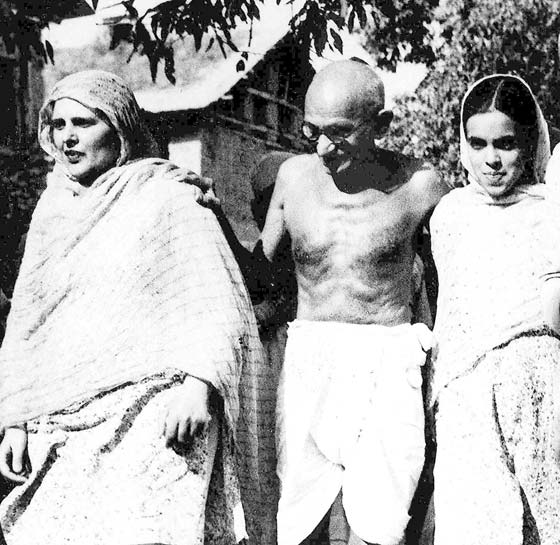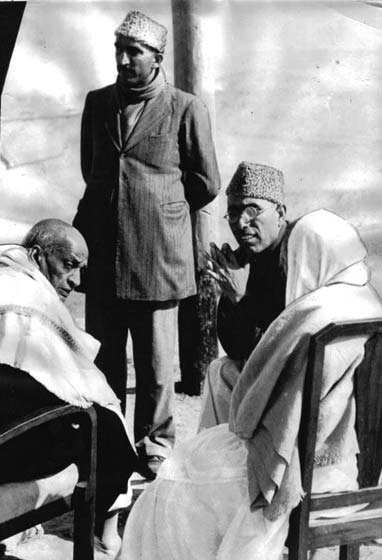Till he was assassinated on January 31, 1948 Mahatma Mohandas Karamchand Gandhi never uttered a word against Delhi’s official stand on Kashmir. It was perhaps because, as historian Ashiq Hussain writes, he had personally permitted flying of army to Srinagar

Before flying troops to Kashmir, Delhi’s powerful trio Pandit Nehru, Lord Mountbatten and Sardar Vallabhbhai Patel needed to take Gandhi’s informal concurrence for the measure. They also wanted to establish that they were sending troops to Kashmir on Kashmiris’ own request. Their task was facilitated by Sheikh Mohammad Abdullah when on October 26, 1947 he volunteered to broach the issue with Gandhi.
“One more obstruction was Mahatma Gandhi. We were divided on whether he would allow sending Indian Army to Kashmir or not. Since I had come to Delhi to request Indian leaders for providing military assistance to me I talked to Gandhiji on this issue,” Sheikh wrote in his autobiography Aatashi-Chinar (page 416). “I told Gandhiji that our struggle in Kashmir was not a fight for land but for those very principles which he himself upheld and represented; which he had preached throughout his life; and for which even at that point of time he stood like a rock braving strong gusts of unfavourable wind. Therefore India should not shy away from assisting Kashmiri people when they were fighting the rapacious raiders. But if India refuses to furnish aid to the people of Kashmir it would be an injustice more to these principles that we cherish together than to the people of Kashmir. Therefore, Gandhiji accepted my request out of love and sanctioned sending of Indian Army to Kashmir.”
All along through the Viceroyalty of Mountbatten Gandhi was complicit with Mountbatten, Nehru and Patel’s grand design on Kashmir so much so that with his help they brought disaster upon Rama Chandra Kak, the pro-independence Prime Minister of Kashmir.

A Congress agent in Srinagar, named Ramadhar who was Secretary All-India Spinners Association (an organisation set up by Gandhi), had informed them through his letter of July 14, 1947 (see page 36 of Sardar Patel’s Correspondence) that the Maharaja was ready to join India and that the hunt for Prime Minister Kak’s substitute had been set in. This letter also revealed that Gandhi was scheduled to visit Kashmir.
However, Ramadhar advised for a postponement of the visit because Maharaja Hari Singh apprehended trouble if Gandhi visited Kashmir during R C Kak’s Prime Ministership.
A pioneering archeologist of the state, Kak became J&K’s chief secretary in 1937, minister for military affairs in 1941, and was chief minister between 1942 and 1945. Later, he was appointed Prime Minister by Hari Singh from June 1946, a position he held till August 11, 1947.
Kak was a staunch supporter of Kashmir’s independence. For that reason his coreligionists, the Kashmiri Pandits, were against him. Also National Conference leaders hated him. Sheikh Abdullah’s trusted lieutenant Mirza Afzal Beg had resigned from Ministry of Public Works when Kak was inducted by Maharaja in 1945 as Dewan. Before Kak’s induction as Dewan they were collaborators of Hari Singh’s Government. It was Kak who placed Nehru under arrest when the latter forced his entry into Kashmir at Kohalla in May 1946 in support of Sheikh’s Quit Kashmir Movement. That made Kak being hated by many from Srinagar to Delhi.
On the eve of Partition it was an open secret that Muslim majority Gurdaspur district would be awarded to India in contravention to Partition principle to furnish a road link between India and Kashmir. Cyril Radcliffe Chairman Boundary Commission (set up on July 9) impressed upon the British Indian members of the Commission that entire Gurdaspur district would be awarded to Hindu India (see pp 12 of From Jinnah to Zia by Justice Mohammad Munir). For this reason Mohammad Ali, Cabinet Secretary-designate of Pakistan, on August 8, 1947, warned Hastings Ismay, Chief of Viceroy’s Staff, that Government of Pakistan would consider the award of Muslim majority Gurdaspur district to Hindu India a breach of faith which in fact would imperil future relations between the Dominion of Pakistan and British Government (see pp 176 Mountbatten and Partition of India by Larry Collins).
In this atmosphere when rumours were making rounds that Gurdaspur would be awarded to India, Congress leaders were desperate to see Kashmiri Prime Minister removed from Premiership. Mountbatten had during his June visit to Kashmir advised both Kak and Maharaja not to declare independence. He told them: “Nehru and Gandhi are very anxious that Maharaja of Kashmir should make no declaration of independence (see pp 120 Mission with Mountbatten by Alan C-Johnson).
In July Mountbatten wrote to Hari Singh that he should pave the way for Gandhi’s visit to Kashmir (see pp 110 Kashmir A Disputed Legacy by Alister Lamb). It all suggests that they considered Kak to be the biggest hurdle in the path of their Kashmir strategy.
In spite of Ramadhar’s advice, Gandhi embarked on imperial mission to Kashmir. On August 2, 1947 he was in Srinagar. This was his first ever visit to Kashmir (see pp 97 Kashmir Behind the Vale by M J Akbar). He stayed at Barzalla where he organised prayer meetings. He met Begum Sheikh Abdullah. He met Maharaja Hari Singh and Maharani Tara Devi at Gulab Bhavan palace. He went to Jammu on August 5, (see pp 119 Kashmir A Disputed Legacy). He left the State on August 10. On August 11, Maharaja Hari Singh sacked Prime Minister Kak and confined him to house arrest.

On arriving back at Delhi Gandhi furnished a report to Nehru: “I organised prayer meetings there but I did not organise any public meetings. Not that there was any ban on addressing people but that I had promised myself that I would not hold any public rally there. I told the Prime Minister Kak that he was very unpopular among the masses. He has written to the Maharaja that he was ready to resign if the Maharaja so wished. When I met the Maharaja, the Maharani was accompanied by their heir apparent son whose one leg was plaster cast. Both Maharaja and Maharani accepted the fact that with the termination of British Raj sovereignty of Kashmir would pass into the hands of the people (see pp 384-5 Aatashi Chinar).
According to Sheikh Abdullah, Gandhi also addressed a press conference at Delhi and told the media that “Maharaja has lost the confidence and support of Kashmiris and Sheikh Abdullah is very popular among masses (ibid).”
Thus Gandhi was instrumental in getting Kak sacked as Prime Minister and disgraced because he supported Kashmir. Kak’s dismissal had also been necessitated by the fact that Sheikh Abdullah would not declare allegiance to India so long as Kak was on prime ministerial seat.
Soon after Kak’s dismissal Sheikh declared his intention to his prison inmates that he would support India. He went to the extent of offering verbal and written apologies to his king against whom he had launched Quit Kashmir Movement (see pp 376 and pp 386 Aatashi Chinar).
Sheikh’s U-turn, coupled with the award of Gurdaspur to India, emboldened Hari Singh’s government so much so that they indulged in ethnic cleansing in Jammu. At the same time they organised cross-border raids on Pakistani villages killing and looting the inhabitants to provoke retaliation from Pakistan side (see pp 67 Sardar Patel’s Correspondence).
Ending October Pakistani tribesmen entered the State. The incursion became the reasons for everybody from Srinagar to seek help from Delhi and it came. Soon after Sheikh was in power and Kak was in chains.















